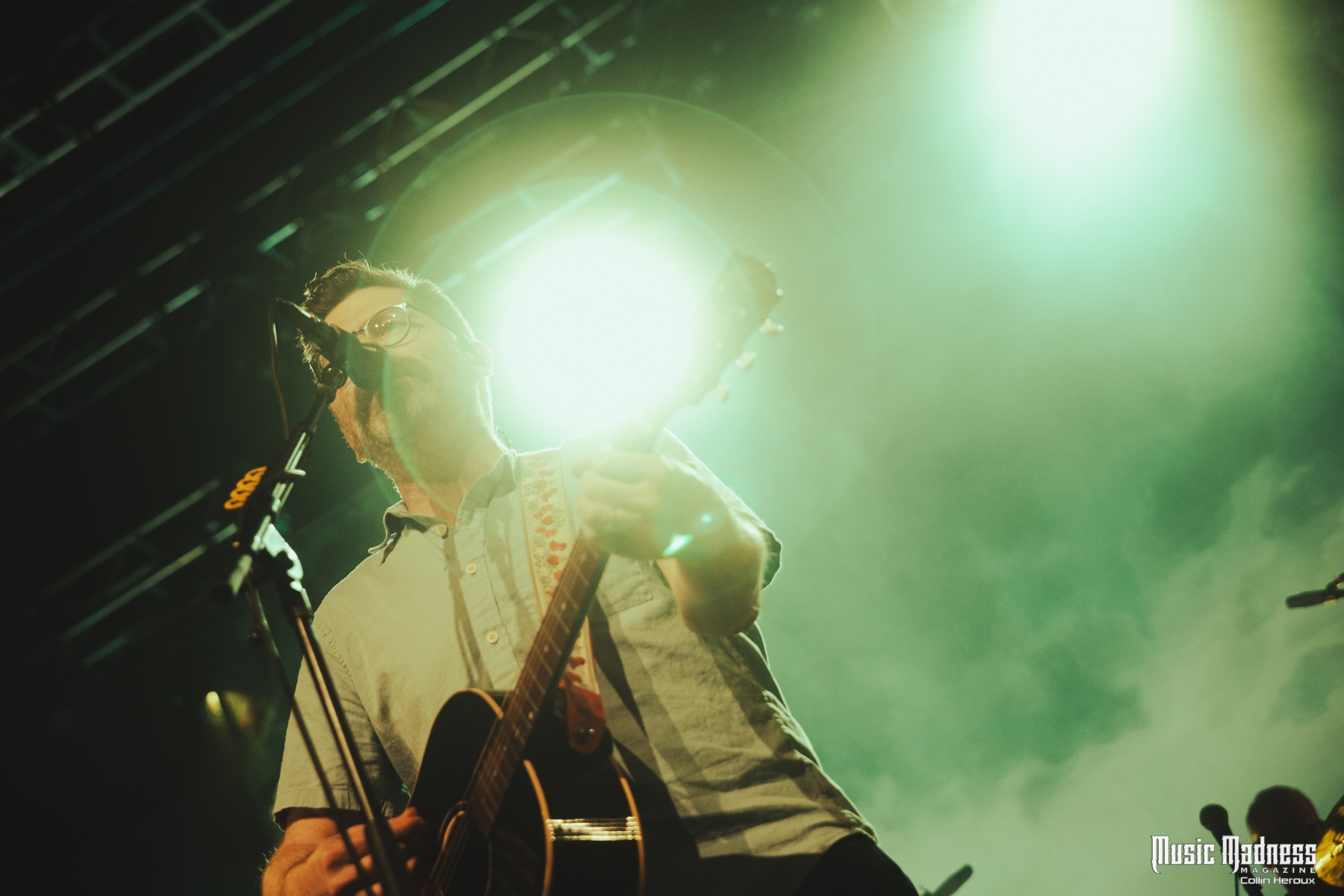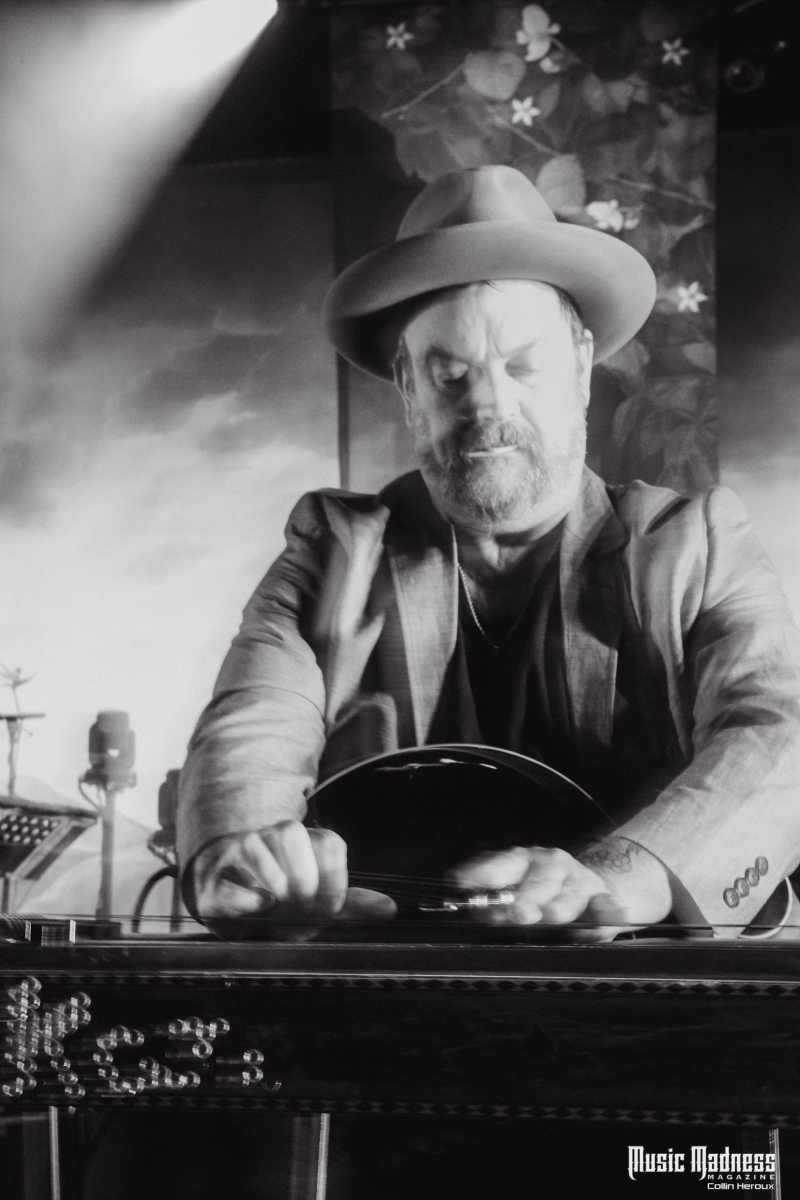
Entering to the immediately-recognizable tuner of Edvard Grieg’s ‘Morning Mood’, a touchstone classical arrangement we’ve all somehow heard early enough in our lives to evoke a certain sort of regal atmosphere, the Decemberists welcome New Haven, CT into their “Peaceable Kingdom”. This is the tagline they’ve given this 2024 tour, though the album it heralds is called As It Ever Was, So It Will Be Again. Their stage is dressed in great detail, with a gorgeously rendered mountain backdrop accented by falling curtains in the shape of flowers, and leaves wrapping most of the microphone stands, giving the seven-member troupe an even greater sense of presence.
Still more than a month out at the time of this show, frontman Colin Meloy declares early on that this tour serves as something of a “beta test” for these new songs, providing the audience with advance glimpses of what’s to come, and their’s plenty to entice. The set begins intimately, the entire band gathered at the front of the stage with minimal instrumentation, bathed in a warm glow from an array of warm lights. They begin this intimate intro with ‘All I Want Is You’ from the new record, then call back many years to ‘Shankill Butchers’, still so haunting in its starkness. To foist more noise upon this delicate composition would be only counterproductive – Meloy’s singular acoustic guitar is bolstered only by Jenny Conlee’s accordion, plus light accentuation from bassist Nate Query and the multifaceted Chris Funk; the remainder of the band contribute backing vocals for the time. The audience are essentially silent as well, absorbing all of it in genuine awe save for the audible swell to sing the instructive refrain: “Everybody moan, everybody shake / the Shankill Butchers wanna catch you… awake” – not only a convenient rhyme, but its closing syllables stress that it’s a much more frightening prospect than being found asleep.
Always ones to borrow from history, legend, and folklore, The Decemberists have existed for more than twenty years, and in that time have established their own kind of mythology – new standout ‘Oh No!’ fits well within that canon, almost immediately recognizable as a quintessential Decemberists song. Ever able to slip into any sort of skin, like a timeless spirit of nature, the song carries a sort of danceable Mariachi flair with the unmistakable timbres of baritone sax and accordion, painting a seedy scene with its subjects stuck memorably between “the Devil and the devil you know,” a hook which ranks among the best the band has penned. Another notable look ahead comes with ‘Long White Veil’, which Meloy says is a “ghost story set in historical Oregon” – the PDX-originated band knows the territory well, and it’s no surprise they’ve opted to bring to life a tale that is as thematic in the region as it is in content.
As for songs long held dear, they play ‘Don’t Carry It All’ off The King is Dead, as well as the first movement of ‘The Crane Wife’ from that so-named record. At the beginning of the latter, when the crowd realizes which song it is, he quips, “It’s going to be that type of night”. Meloy takes a big gulp of wine during ‘Severed’, a song from I’ll Be Your Girl that challenged the conception of what a Decemberists song might be instrumentally, even as the primal forces of nature remained familiarly centered in the lyrics.
Around the time oldie ‘16 Military Wives’ appears in the setlist, talking to the audience during a mid-song interlude, Meloy seems to realize in real time that it’s been a good 20 years since that song was recorded. He thinks aloud about what it would be like to tell his 29-year-old self that two decades later he’d be singing a song he’d just put to tape, then “tossing out picks with [his] band’s name on them.” At some point, the genuine and very appreciative stream of consciousness takes a bit of a detour, however, and he remarks, “Death comes for us all… a little public service announcement”. All this happens rather quickly, then during the return to the song proper with a big crowd participation moment, he aims the microphone out at the audience after suggesting: “Sing away the death!” But even this talk of death is couched within the great time everyone is having, visibly including the band, when the song picks up again Meloy is jumping up and down with guitar in hand without missing a beat.
The close of the main set is brought on with ‘I Was Meant for the Stage’, a song that was always a winking fourth-wall break, but every time I’ve seen them perform it, it has seemingly become more quasi-autobiographical for Meloy. While its delusions of grandeur need not be the truth, even without any significant knowledge of Meloy’s personal life, the hopes of admiration from a mother and forgiveness from a father ring at least a bit true for anyone who has been drawn to creative, and perhaps not typically economically viable, pursuits.
Now, it would be both chronologically and categorically wrong to call the encore of a show the “centerpiece” of the evening, but it does bring with it, in this case, by far the show’s hugest moment. Normally the notion of the ‘one-song encore’ is cause for light disappointment – but ‘Joan in the Garden’, a recently-released single from the upcoming record, is anything but that.
Some background: The Decemberists’ 2009 album The Hazards of Love is an absolute gem of a record: a pure, undiluted example of a band committing wholeheartedly to a premise, as any rock opera must be. It’s the reason the sentence “The Decemberists can be metal when they want to” isn’t something one can dismiss out of hand. The twenty-minute ‘Joan’ is a welcome return to the prog excellence that defined that album, and the band plays it as the final song of the evening. It starts slowly, the musicians backlit by suitably dramatic god-ray lights. Conlee’s keys give it a base of epic religiosity, and anyone raised on Pink Floyd will recognize the tone of the guitars when they arrive to cut a demanding path into the composition. Drummer John Moen is responsible for the steady, patient ramp-up here, and the lyrics find Meloy repeating the ancient religious exultation, “Hosanna”, alongside images both modern and antiquated.
They fake the audience out mid-song with a lull; everything slows to a drone that becomes more amorphous until it loses all melody and is joined by twisted metallic noises. A sonar-like pinging begins, gradually escalating to the return to the main structure of the song and its impassioned zenith. When the passionate movement finally concludes, Meloy and company wave a fond farewell to the audience from their position on the stage. Their upcoming record may not be a rock opera, but by all available previews, it sees the Decemberists committing as much they can in the direction they choose to pursue, be it a soaring prog opus, Latin dance, or their timeless folk angle. They remain an exemplar of the wonderful, broadly defined intersection between folk and rock – as it ever was, so it will be again.
Photos and Review by Collin Heroux

























